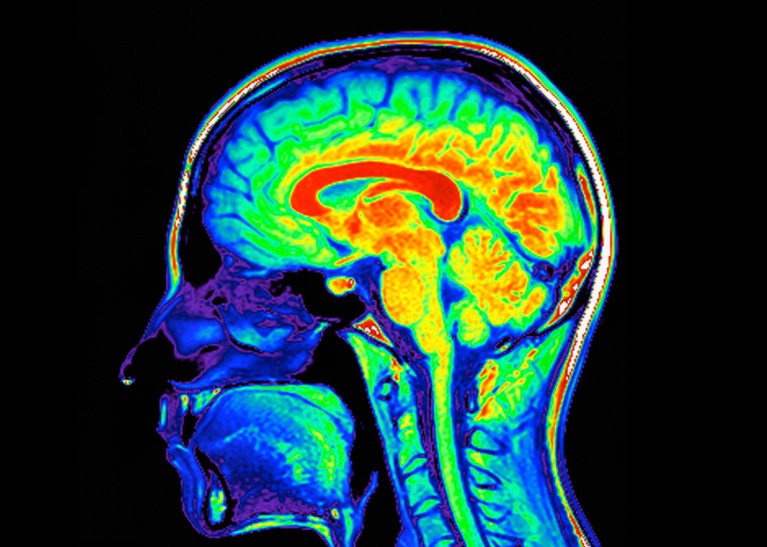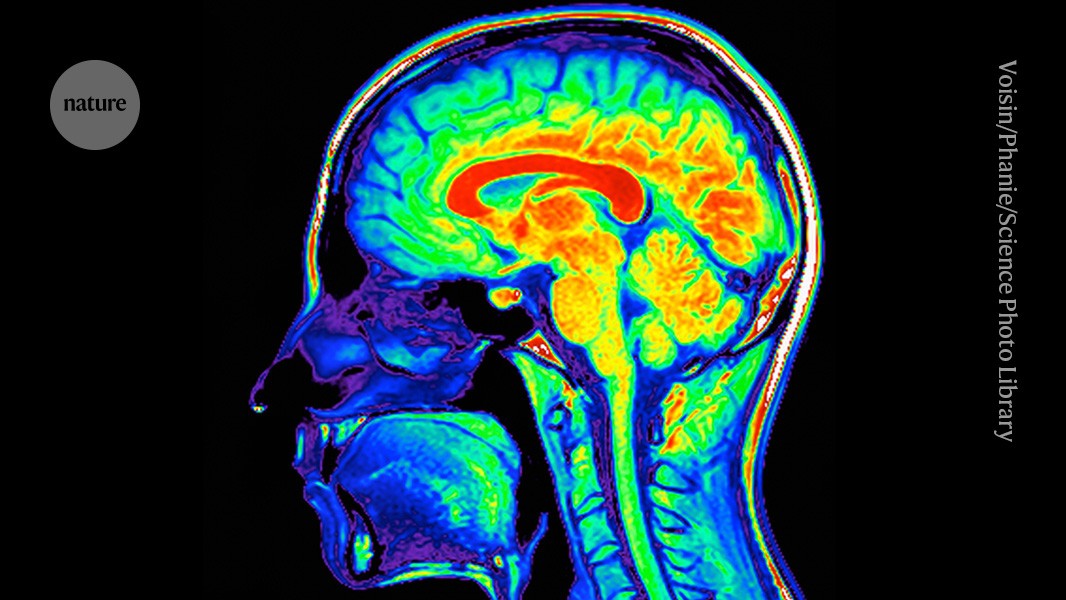
A population of neurons in the brain stem, the stalk-like structure that connects the bulk of the brain to the spinal cord, acts as the master dial for the immune system.Credit: Voisin/Phanie/Science Photo Library
Scientists have long known that the brain plays a part in the immune system — but how it does so has been a mystery. Now, scientists have identified cells in the brainstem that sense immune cues from the periphery of the body and act as master regulators of the body’s inflammatory response.
The results, published on 1 May in Nature1, suggest that the brain maintains a delicate balance between the molecular signals that promote inflammation and those that dampen it — a finding that could lead to treatments for autoimmune diseases and other conditions caused by an excessive immune response.
The discovery is akin to a black-swan event — unexpected but making perfect sense once revealed, says Ruslan Medzhitov, an immunologist at Yale University in New Haven, Connecticut. Scientists have known that the brainstem has many functions, such as controlling basic processes such as breathing. However, he adds, the study “shows that there is whole layer of biology that we haven’t even anticipated”.
The brain is watching
After sensing an intruder, the immune system unleashes a flood of immune cells and compounds that promote inflammation. This inflammatory response must be controlled with exquisite precision: if it’s too weak, the body is at greater risk of becoming infected; if it’s too strong, it can damage the body’s own tissues and organs.
Previous work has shown that the vagus nerve, a large network of nerve fibres that links the body with the brain, influences immune responses. However, the specific brain neurons that are activated by immune stimuli remained elusive, says Hao Jin, a neuroimmunologist at the US National Institute of Allergy and Infectious Diseases in Bethesda, Maryland, who led the work.
To investigate how the brain controls the body’s immune response, Jin and his colleagues monitored the activity of brain cells after injecting the abdomen of mice with bacterial compounds that trigger inflammation.
How the brain senses a flu infection — and orders the body to rest
The researchers identified neurons in the brainstem that switched on in response to the immune triggers. Activating these neurons with a drug reduced the levels of inflammatory molecules in the mice’s blood. Silencing the neurons led to an uncontrolled immune response, with the number of inflammatory molecules increasing by 300% compared with the levels observed in mice with functional brainstem neurons. These nerve cells act as “a rheostat in the brain that ensures that an inflammatory response is maintained within the appropriate levels”, says study co-author Charles Zuker, a neuroscientist at Columbia University in New York City.
Further experiments revealed two discrete groups of neurons in the vagus nerve: one that responds to pro-inflammatory immune molecules and another that responds to anti-inflammatory molecules. These neurons relay their signals to the brain, allowing it to monitor the immune response as it unfolds. In mice with conditions characterized by an excessive immune response, artificially activating the vagal neurons that carry anti-inflammatory signals diminished inflammation.
Dampening autoimmune symptoms
Finding ways to control this newly discovered body–brain network would offer an approach to fixing broken immune responses in various conditions such as autoimmune diseases and even long COVID, a debilitating syndrome that can persist for years after a SARS-CoV-2 infection, Jin says.
Cracking the genetic code of autoimmune disease
There’s evidence that therapies targeting the vagus nerve can treat diseases such as multiple sclerosis and rheumatoid arthritis, suggesting that targeting the specific vagal neurons that carry immune signals might work in people, Zuker says. But, he cautions, “it’s a lot of work to go from here to there”.
Besides the neuronal network identified in the study, there might be other routes through which the body transmits immune signals to the brain, says Stephen Liberles, a neuroscientist at Harvard Medical School in Boston, Massachusetts. What’s more, the mechanisms by which the brain sends signals back to the immune system to regulate inflammation remain unclear. “We’re just scratching the surface,” he says. “We need to understand the rule book of how the brain and the immune system interact.”







More News
Could bird flu in cows lead to a human outbreak? Slow response worries scientists
US halts funding to controversial virus-hunting group: what researchers think
How high-fat diets feed breast cancer